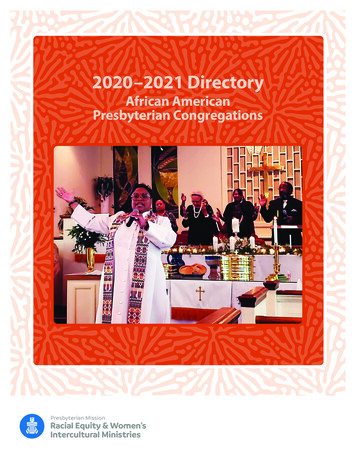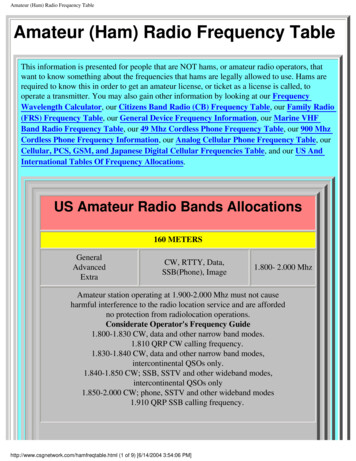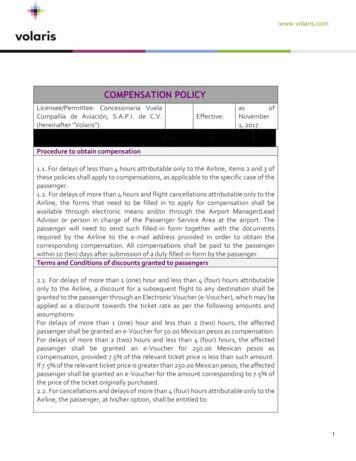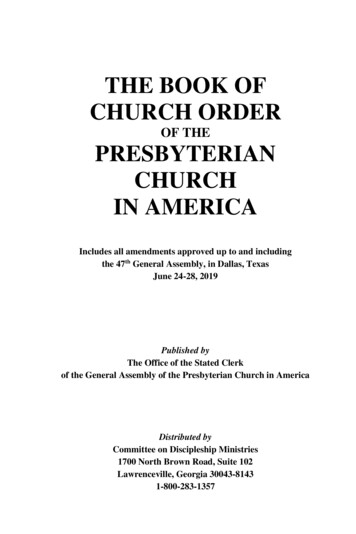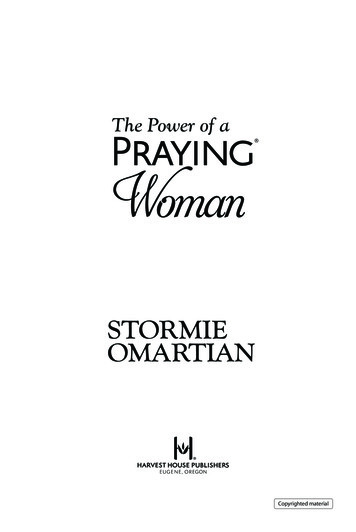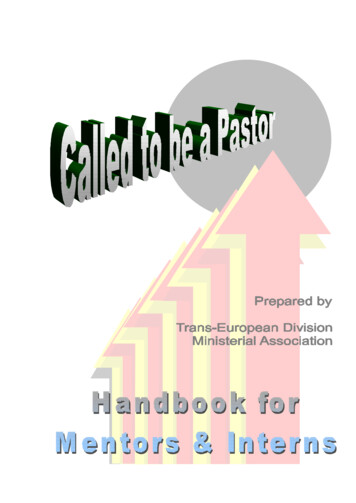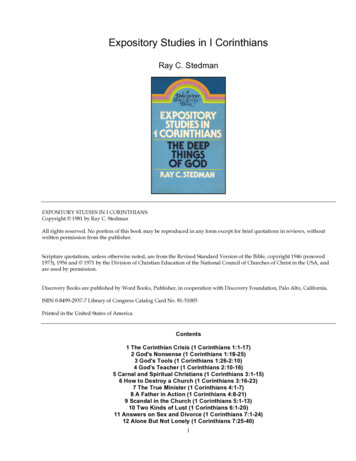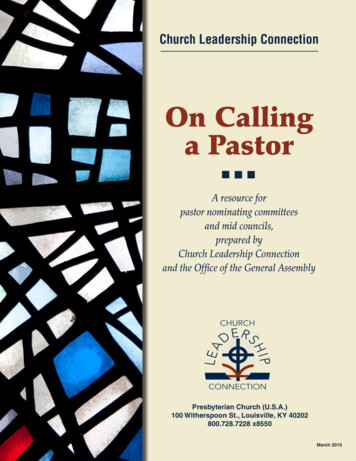
Transcription
Church Leadership ConnectionOn Callinga PastorA resource forpastor nominating committeesand mid councils,prepared byChurch Leadership Connectionand the Office of the General AssemblyPresbyterian Church (U.S.A.)100 Witherspoon St., Louisville, KY 40202800.728.7228 x8550March 2015
On Calling a PastorA Manual for Churches Seeking PastorsThis is what God says, the God who builds a road right through the ocean,who carves a path through pounding waves,The God who summons horses and chariotsand armies—they lie down and then can’t get up;they’re snuffed out like so many candles:“Forget about what’s happened; don’t keep going over old history.Be alert, be present. I’m about to do something brand-new.It’s bursting out! Don’t you see it? (Isaiah 43:16- 19 - The Message Bible)As you begin the journey to find new pastoral leadership, the next few months will be exciting,tedious, joyful, spiritually fulfilling, frustrating, inspiring, lengthy, and purposeful. The process isone of discernment and will challenge the congregation to listen closely for the will of God for itsmission and ministry in this new stage of the congregation’s life.This is a new step of faith that will bring your congregation together around the common goalof identifying who God is calling to serve your congregation. This manual is designed to bea resource for those who are on this journey. We suggest that you use this resource to guideyou through the call process. The policies and procedures of your presbytery will always takeprecedence over this manual. Therefore, it is important for the session, presbytery, and the PNCto stay in regular contact with one another so that everything may be done “decently and in order”from the time of a pastor’s departure all the way through the calling and installing of a new pastor.This resource is formatted into a PDF that may be read online or downloaded and printed. It alsoincludes videos that expand several topics. Topics that include videos are indicated with an icon.Click on the icon to link to the video online at www.pcusa.org/clc. Web pages where appropriateare provided with helpful links for further resourcing. Leadership Competencies case studies areprovided for group activity and discussions in Part Five.Each section of the manual builds upon the next to walk you through the call process:demonstrating the denomination’s theology of call and the role of each partner in the callprocess, inputting your form into the CLC system, and providing words of wisdom to increase thelikelihood of you making the best ministry match possible.Those who would benefit most from having this manual are sessions, presbytery liaisons, PNCsand others who support congregations in the midst of transition.As you embark on this journey, we pray that you will know the power of God’s presence each stepof the way. When you finally find the person whom God has called to be your new pastor, we hopeyou will be a blessing to the world in your ministry together.The Presbyterian Church (U.S.A.)Office of the General AssemblyChurch Leadership Connection (CLC)Mid Council Ministries
Table of ContentsPART ONE — Introduction to Calling a PastorAcronymns Used in This Resource. 5On Calling a Pastor Video IntroductionTheological Foundations of the Call ProcessSpiritual Resources for the JourneyOther Resources. 5God Calls Women and Men to Serve as Pastors. 6Beliefs in Practice. 6Openness, F-1.0404ConnectionalismTeaching Elder Defined, G-2.0501Ordination Standards, G-2.0104bPART TWO — Teaching Elders as PastorsTypes of Pastoral Positions. 9Installed Pastoral RelationshipsTemporary Pastoral RelationshipsSuccession Restrictions (G-2.504a, b)Exceptions to Succession Restrictions (G-2.504c)Ministers of Other DenominationsCovenant of Agreement PartnersMinisters of Other Christian ChurchesImmigrant Fellowships and CongregationsLeadership Options for Small Congregations.11PC(USA) Teaching EldersBi-Vocational/TentmakersSupply/Temporary PastorsSmall Church Residency ProgramVideos about the program:Ruling Elders Commissioned for Particular Pastoral Service (CRE)On Calling a Pastor1
Table of ContentsPART THREE — The Call ProcessPolity and the Call Process.14Presbytery as a Participant in the Pastoral Call Process.15Presbytery’s RoleKey Times for Presbytery InvolvementWhen Your Pastor Announces His or Her DepartureDuring the Pastoral VacancyWorking with the Pastor Nominating CommitteeWhen the New Pastor Is CalledWhen Your Pastor Is Ordained and/or InstalledAs Your Pastor Ministers with YouOther Participants in the Pastoral Call Process.16The SessionThe Moderator of SessionThe Temporary PastorThe Pastor Nominating CommitteeThe CongregationPART FOUR — The TransitionDissolving the Pastoral Relationship. 19Resources for Congregations in Pastoral TransitionPlanning for Transition. 20Next Steps in Ministry. 20Assessing Your FinancesCompensation PackageElecting a Pastor Nominating Committee. 23The Process for Electing a Pastor Nominating Committee (PNC)2On Calling a Pastor
Table of ContentsPART FIVE — Searching for a PastorThe Work of the Pastor Nominating Committee (PNC). 25Getting OrganizedScheduling PNC MeetingsSuggestions for Your WorkUnderstanding Your WorkConfidentialitySelecting LeadershipUsing the Church Leadership Connection (CLC). 27CLC Mission StatementFoundational Principles for CLCWho Can Use the SystemWho May Enter a Personal Information Form (PIF)Who May Enter a Ministry Information Form (MIF)Writing the Ministry Information Form (MIF). 28Your Ministry Narrative Through the MIFEstablishing Matching Criteria. 29Additional Matching CriteriaOptional Matching Criteria ExampleLeadership Competencies. 31Case Study ExerciseCase Study One — Twenty-First Century Presbyterian ChurchCase Study Two — Transitioning Presbyterian ChurchCase Study Three — Faithful Presbyterian ChurchQuestions to ConsiderEffective Salary. 33Board of Pensions DefinitionSpecial Programs to Support Pastors with Educational Debtand Those Serving Smaller Congregations. 33Transformational Leadership Debt Assistance (TLDA)Seminary Debt Assistance and the BOPMinistry Information Form (MIF) Narrative Questions. 33On Calling a Pastor3
Table of ContentsChoosing a Pastor.34Call and FitTwenty-First Century LeadersCalling Candidates for MinistryReceiving ReferralsSelf-Referrals Through CLCAttestation AssuranceA Word About Possible PIF DifferencesAcknowledging Receipt of a PIFMinisters from Other DenominationsReading and Screening Personal Information FormsEvaluating PIFsA Suggested ProcessRequesting Additional MaterialsSermon VideosSupplemental QuestionsOther MaterialWeb SitesEstablishing an Interview ProcessAppropriate Questions for InterviewsReference ChecksMeeting Prospective Pastors Face-to-Face.39Visiting Prospective Pastors in Their Ministry SettingHosting Prospective Pastors in Your CommunityPracticing HospitalityPART SIX — Calling a New PastorChoosing the Nominee and Extending the Invitation to Call.41Extending the InvitationContacting Your Chosen NomineeWhen the Nominee Accepts the InvitationNegotiating the Terms of CallExamination for Membership in the PresbyteryPresenting the Pastor Elect. 42Preparing to Present Your Nominee to the CongregationObtaining Presbytery ApprovalCoordinating with SessionPreparing a Report for the CongregationPresenting the Nominee to the CongregationFinishing Your Work. 43Notifying CLC of a “Call Pending”Notifying Remaining Prospective PastorsDisposing of PNC MaterialsSharing Agreements with SessionUnderstanding Your New Role4On Calling a Pastor
PART ONE – Introduction to Calling a PastorPART ONE — Introduction to Calling a PastorAcronyms Used in This ResourceA number of acronyms are used in the call process. To help you become familiar with the mostcommon acronyms, we have listed them below.MIFCLCEP/GPPIFPNCCOMCPMBook of OrderF — Foundations of Presbyterian PolityG — Form of GovernmentW — Directory for WorshipD — Rules of DisciplineMinistry Information FormChurch Leadership ConnectionExecutive/General PresbyterPersonal Information FormPastor Nominating CommitteeCommittee/Commissions on MinistryCommittee/Commissions on Preparation for MinistryVideo Introductionv On Calling a Pastor Video Introductionhttp://www.pcusa.org/ocapv Spiritual Resources for the JourneyThe most important resources you will need on this journey are the spiritual resources ofScripture and prayer. During this journey, be deliberate about spending time together withGod‘s word and in prayer, not simply as bookends to a meeting but as an important part oflistening for God’s spirit. Here are a few resources that may be helpful on your journey:Scripture Passages About Call:Other Scriptures:Genesis 12:1–9Genesis 24:1–61Exodus 3:1–121 Samuel 31 Kings 19:1–181 Kings 19:19–21Esther 4:1–17Isaiah 6:1–13Jonah 1Matthew 4:18–22Luke 1:26–55John 1:43–51Acts 1:15–26Acts 9:1–19Acts 16:14–15Revelation 3:14–22Genesis 32:22–32Isaiah 52:7Nehemiah 2:12Nehemiah 1:4-11Ezekiel 37:1-14Joel 2:28Matthew 20:26Matthew 22:14Matthew 28:16–20Matthew 6:25–34Jeremiah 3:15Acts 1:81 Corinthians 12:4–27Ephesians hJonahThe disciplesMaryPhilip and NathanaelMatthiasPaulLydiaThe churchesJacob wrestles with GodThe purpose of preachingGod’s missionBathe your work in prayerThe valley of dry bonesWomen and men are calledServant leadersMany are called but few are chosenThe Great CommissionDon’t worryPastors after God’s heartEmpowered by the Holy SpiritDiversity of giftsEquipping the church for ministryOn Calling a Pastor5
PART ONE – Introduction to Calling a PastorOther Resources:v The Book of Order, especially the Foundations of Presbyterian Polity, Chapters 1–3v The Book of Common Worship, especially Daily PrayerGod Calls Women and Men to Serve as Pastors“In sovereign love God created the world good and makes everyone equally in God’s image,male and female, of every race and people, to live as one community.”(Book of Confessions, Brief Statement of Faith, 10.3, Lines 29–32)“The same Spirit who inspired the prophets and apostles rules our faith and life in Christthrough Scripture, engages us through the Word proclaimed, claims us in the waters ofbaptism, feeds us with the bread of life and the cup of salvation, and calls women and mento all ministries of the Church.”(Book of Confessions, Brief Statement of Faith, 10.4, Lines 58–64)Beliefs in PracticeOpennessF-1.0404 Book of OrderIn Jesus Christ, who is Lord of all creation, the Church seeks a new openness to God’smission in the world. In Christ, the triune God tends the least among us, suffers the curse ofhuman sinfulness, raises up a new humanity, and promises a new future for all creation. InChrist, Church members share with all humanity the realities of creatureliness, sinfulness,brokenness, and suffering, as well as the future toward which God is drawing them. Themission of God pertains not only to the Church but also to people everywhere and to allcreation. As it participates in God’s mission, the Presbyterian Church (U.S.A.) seeks:a new openness to the sovereign activity of God in the Church and in the world, to a moreradical obedience to Christ, and to a more joyous celebration in worship and work;a new openness in its own membership, becoming in fact as well as in faith a communityof women and men of all ages, races, ethnicities, and worldly conditions, made one inChrist by the power of the Spirit, as a visible sign of the new humanity;a new openness to see both the possibilities and perils of its institutional forms inorder to ensure the faithfulness and usefulness of these forms to God’s activity in theworld; anda new openness to God’s continuing reformation of the Church ecumenical, that it mightbe more effective in its mission.6On Calling a Pastor
PART ONE – Introduction to Calling a PastorConnectionalismPresbyterians as members of the Body of Christ live out our faith through connectionalpolity. The polity of the church provides a denomination-wide PC(USA) framework inwhich we confess together our creeds and our acts of faith. In a connectional system,decisions made by one body affect the body as a whole. Each governing body supports,guides, and holds accountable the other bodies in a faithful attempt to live out our faith asconfessed in scripture and our Book of Confessions.Teaching Elder DefinedG-2.0501 Book of OrderTeaching elders (also called ministers of the Word and Sacrament) shall in all things becommitted to teaching the faith and equipping the saints for the work of ministry (Eph.4:12). They may serve in a variety of ministries, as authorized by the presbytery. When theyserve as preachers and teachers of the Word, they shall preach and teach the faith of thechurch, so that the people are shaped by the pattern of the gospel and strengthened forwitness and service. When they serve at font and table, they shall interpret the mysteries ofgrace and lift the people’s vision toward the hope of God’s new creation. When they serveas pastors, they shall support the people in the disciplines of the faith amid the strugglesof daily life. When they serve as presbyters, they shall participate in the responsibilitiesof governance, seeking always to discern the mind of Christ and to build up Christ’s bodythrough devotion, debate, and decision.Ordination StandardsG-2.0104b Book of OrderStandards for ordained service reflect the church’s desire to submit joyfully to the Lordshipof Jesus Christ in all aspects of life (F-1.02). The council responsible for ordination and/or installation (G-2.0402; G-2.0607; G-3.0306) shall examine each candidate’s calling, gifts,preparation, and suitability for the responsibilities of ordered ministry. The examinationshall include, but not be limited to, a determination of the candidate’s ability andcommitment to fulfill all requirements as expressed in the constitutional questions forordination and installation (W-4.4003). Councils shall be guided by Scripture and theconfessions in applying standards to individual candidates.On Calling a Pastor7
PART ONE – Introduction to Calling a Pastor8On Calling a Pastor
PART TWO – Teaching Elders as PastorsPART TWO — Teaching Elders as PastorsTypes of Pastoral PositionsThe types of pastoral positions are pastor, co-pastor, and associate pastor. Pastoral relationshipswith congregations can be either “installed” or “temporary.”Installed Pastoral RelationshipsInstalled pastoral relationships are typically for an indefinite period. However, an installedpastor may be called for a designated term as determined by the presbytery, in consultationwith the congregation. Calls with a predetermined end date may be renewed for an additionaldesignated term or changed, with the approval of the presbytery and congregation, to anindefinite call.Temporary Pastoral Relationshipsv Session invites for service with presbytery concurrencev Teaching elder, PC(USA) or other; PC(USA) candidate, or ruling elderv Titles determined by presbyteryv Up to twelve-month terms, but may be renewed“Titles and terms of service for temporary relationships shall be determined by the presbytery.A person serving in a temporary pastoral relationship is invited for a specified period not toexceed twelve months in length, which is renewable with the approval of the presbytery. Ateaching elder employed in a temporary pastoral relationship is ordinarily not eligible to serveas the next installed pastor, co-pastor, or associate pastor.” (Book of Order, G-2.0504b)Succession RestrictionsOrdinarily an associate pastor is not eligible to become the next installed pastor of thecongregation he or she is serving. In the same way, a temporary pastor is not ordinarily eligibleto become the next installed pastor, co-pastor, or associate pastor (Book of Order, G-2.0504a-b).If a presbytery determines that in its mission strategy it is advisable for a teaching eldercurrently serving as associate pastor or temporary pastor, to be permitted to serve as the nextinstalled pastor, co-pastor, or associate pastor, the relationship shall be established by athree-fourths vote of the members of the presbytery present and voting (Book of Order,G-2.0504c).On Calling a Pastor9
PART TWO – Teaching Elders as PastorsMinisters of Other DenominationsThe Book of Order affirms the ecumenical commitment of the Presbyterian Church (U.S.A.),particularly in Chapter Five of the Form of Government: Ecumenicity and Union. Thissection outlines our relationships with other denominations and holds that the basis of theserelationships is to give visibility to the unity that exists in Christ.The General Assembly of the Presbyterian Church (U.S.A.) has authorized and directed theformation of covenants, agreements, and statements of purpose with other Christian bodiesthat address, among other things, the mutual recognition of baptism and the orderly exchangeof ministers. Such agreements are said to place us in correspondence with one another.The PC(USA) is in a relationship of correspondence, meaning the church maintains arelationship with the highest council or governing body with the following:v Churches with which the PC(USA) has had historical relations outside the United States,as recognized by the General Assembly.v Churches that are members of the ecumenical bodies (for example: the World Councilof Churches, World Communion of Reformed Churches, National Council of Churches,Christian Churches Together, etc.) in which the PC(USA) holds membership.v Churches with which the PC(USA) has formal ecumenical dialogue approved by theGeneral Assembly.The Presbyterian Church (U.S.A.) is in full communion or covenant relationship with thosechurches so recognized by the General Assembly. These relationships exist as a matter ofecumenical agreement.Covenent of Agreement PartnersA minister of another Reformed Church as a part of the Formula of Agreement may bepermitted to serve a PC(USA) congregation under the Orderly Exchange Process. Ministers ofFormula of Agreement denominations (Evangelical Lutheran Church in America, ReformedChurch in America, and the United Church of Christ) under “Orderly Exchange” may serveas an installed or temporary pastor of a PC(USA) congregation by invitation from a PC(USA)presbytery (regional mid council).For more information see:v Advisory Opinion for Receiving Ministers of Other elationships/correspondence-and-pcusa/v Formula of Agreement greement/v Under Covenant Agreement Between the Korean Presbyterian Church Abroad and thePresbyterian Church (U.S.A.) http://oga.pcusa.org/site media/media/uploads/oga/pdf/kpcapcusa orderly exchange w out pif revised[1].pdfv Highlights to calling ministers under the Formula of Agreement (the Process for OrderlyExchange) mployment-ministers-other-deno10On Calling a Pastor
PART TWO – Teaching Elders as PastorsMinisters of Other Christian ChurchesMinisters of other denominations that are not a part of the Formula of Agreement churchesmay serve PC(USA) congregations on a temporary basis if their service meets the missionstrategy of the presbytery. Refer to your presbytery for guidance on this issue.Immigrant Fellowships and CongregationsImmigrant fellowships and congregations often have particular needs for pastoral leadershipthat may be difficult to fill. When the presbytery determines that its mission strategywith one of these fellowships or congregations requires it, the presbytery may recognizethe ordination of a minister in good standing in another denomination. If the ministerlacks the educational history required of our candidates, the presbytery will then provideeducational opportunities as necessary and prudent for the minister’s successful ministryin the presbytery. Immigrant fellowships and congregations must work closely with thepresbytery to secure appropriate pastoral leadership and to ensure that they are followingthe constitutional process described in G-20505a (1) for calling an immigrant pastor.Leadership Optionsfor Small Congregationsv PC(USA) Teaching Elders — Called to serve smaller congregations as part-time pastors ininstalled and temporary positions.v Bi-Vocational/Tentmakers — PC(USA) teaching elders who serve as pastor and also workin other employment that may be ministry related or not. When considering a tentmakerpastor, it is important to remember that the person must divide his or her time amongmultiple employers. The pastor will be restricted in the number of hours he or she hasavailable to work for the church. These individuals are members of the presbytery andserve as all other teaching elders except in their hourly commitment to the congregation.v Supply/Temporary Pastors — Teaching elders and candidates serving as temporary supplypastors. The specific title of the position may differ among presbyteries. These contractpositions are made with the session with the approval of the presbytery. The contractpositions are for twelve months and can be renewed annually with presbytery approval.(For more information, see G-2.504b.)v Small Church Residency Program — Open to first-call pastors who are PC(USA)candidates for ministry and have been certified by their presbyteries as ready tonegotiate for service. This program pairs small, underserved congregations in a varietyof ministry settings with recent seminary graduates who are interested in answeringGod’s call to serve where there is need in the PC(USA), specifically in small-membershipcongregations. For more information see:— dency/about-program/— Video — ideos/On Calling a Pastor11
Part TWO – Teaching Elders as Pastorsv Ruling Elders Commissioned for Particular Pastoral Service (CRE) — Ruling elders maybe commissoned to a particular congregation for a specified term that should not exceedthree years. However, the commission can be renewed. Ruling elders who seek to serveas CREs must meet the training and examination of their presbytery. The commission ofCREs is limited to their presbytery of membership. For more information, see G-2.10.Raising Up New Leaders Video — s/clp/12On Calling a Pastor
PART THREE – The Call ProcessPART THREE — The Call Process“ The question before us could beframed thusly: ‘God, whom areyou selecting/calling at this timeto lead in this church? Show usyour choice.”— Selecting Church Leaders,The Alban Institute, 2002“Christ calls the Church into being, giving it all that is necessary for its mission in the world, for itssanctification, and for its service to God. Christ is present with the Church in both Spirit and Word.Christ alone rules, calls, teaches, and uses the Church as he wills.” (Book of Order, F-1.0202).Presbyterians believe that God uses committees, papers, procedures, and our polity, sprinkledwith a generous measure of prayer, Scripture, and worship, to help you discern who it isthat God is calling to be your pastor. This call is confirmed as the pastor, the church, and thepresbytery each say “yes” to the relationship.PresbyteryCongregationPastorThis three-way partnership is acted out throughout the pastoral call process, with thepresbytery having the primary responsibility for oversight of the process. “. No pastoralrelationship may be established, changed, or dissolved without the approval of the presbytery”(Book of Order, G-2.0502).On Calling a Pastor13
PART THREE – The Call ProcessDuring the time of transition between pastors, a congregation is invited to engage in a spiritualdiscernment process to discover or reconfirm its call to ministry—what God wants thechurch to be and do in the next phase of the congregation’s life. Your presbytery may ask yourcongregation to engage in a mission study that involves Bible study, prayer, and an honest andthoughtful look at your congregation and community, as a way to discern the ministry directionin which God is leading you.Once this becomes clear, the pastor nominating committee (PNC), in consultation with thepresbytery, begins the discernment process of discovering who God is calling to be the pastorin this next chapter of your congregation’s life and ministry.Polity and the Call ProcessThe Presbyterian Church (U.S.A.) call process reflects the way our ministryis governed today. Our church polity is representative, and this form ofgovernment is seen throughout the call process. To understand how ourpolity is distinct from that of other denominations, see this short video onDenominational Polities at http://www.pcusa.org/ocap.Below is a suggested call process. It describes the role of each partner in the process: thepresbytery, COM, session, PNC, pastor, and congregation. For additional information, view thevideo, The Call Process, at http://www.pcusa.org/ocap.The Call ProcessContact the COMupon Notification of thePastor’s Resignation(Session)PlanFor the Transition(COM and Session)Dissolvethe PastoralRelationship(Presbytery)Confer With COMWhether a MissionStudy Will Be Required(Session)Writethe MIF(PNC)Electthe PNC(Congregation)Authorizea CongregationalMeeting to Electa PNC (Session)Assessthe Financial Capabilityof the Congregation(Session and COM)DiscernYourLeadership Needs(COM and Session)SubmitMIF to CLCfor Matching(PNC)Definean InterviewProcess(PNC)Review andReceivePIF Referrals(PNC)Reference CheckPresbytery,Background, andOthers (Presbytery)Selecta Nominee(PNC)Authorizea CongregationalMeeting to Electthe Pastor (Session)ReportCall to theSession(PNC)ApprovalCall and Terms(COM)NegotiateTerms of Call(PNC and Minister)Extenda Call(PNC)Signthe Call(PNC and COM)Your Work Is CompleteDERSHIPElectthe Pastor(Congregation)LEACHURCHCONNECTION14On Calling a Pastor
PART THREE – The Call ProcessBook of Order References — Call and G-2.0805OrdinationPastoral VacancyElection of a Pastor Nominating CommitteeCall ProcessTerms of CallInstallation ServicePresbytery as a Participant in the Pastoral Call ProcessPresbytery’s RoleThe presbytery will be your companion in the search process, often through someone whowill serve as your liaison. Your presbytery liaison will provide you with guidance, resources,and other services as you go through the pastoral search process. In many presbyteries, theliaison will help you to assess your leadership needs, financial health, and the type of pastoralleadership you need such as full-time, part-time, bi-vocational, installed, or temporary. It is wiseto consult regularly with your presbytery liaison not only for advice and guidance but to keephim or her informed, especially at key times in your pastoral search process.The presbytery will work closely with the pastor nominating committee (PNC), which has beenelected to present a pastor or associate pastor nominee to the congregation. The presbyteryhas the responsibility to guide and participate in the decision of the PNC. The presbytery willprovide the PNC “counsel on the merits, suitability, and availability of those considered for thecall” (Book of Order, G-2.0803).Each presbytery is unique and will have its own procedures and policies regarding the searchprocess, which supersede any procedures found in this manual. Therefore, it is important for acongregation seeking a new pastor to be in regular contact with the presbytery.Key Times for Presbytery InvolvementThere are several key times in the call process when it is particularly important for presbytery tobe involved with your congregation.When Your Pastor Announces His or Her Departure. As your current pastor prepares to leave,presbytery has the responsibility to dissolve the pastoral relationship, appoint a moderatorfor your session, and provide you with guidance about pulpit supply.During the Pastoral Vacancy. Presbytery has the responsibility to assist the session withissues related to pastoral vacancies, including securing temporary pastoral leadership;assessing congregational finances, including costs associated with a pastoral search andpastoral compensation; engaging in a congregational mission study (if required); approval ofthe Ministry Information Form (MIF); and nominating and electing a PNC.Working with the Pastor Nomi
PART ONE – Introduction to Calling a Pastor Other Resources: v The Book of Order, especially the Foundations of Presbyterian Polity, Chapters 1–3 v The Book of Common Worship, especially Daily Prayer God Calls Women and Men to Serve as Pastors “In sovereign love God created the world good an
